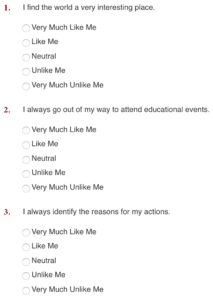Like many, or perhaps like every person on this earth, I’d like to find happiness.
Happiness, of course, is an elusive concept. It means something different for me than it does for you. And to some, finding happiness is the ultimate goal in life. For others, it is not something to be pursued at all; it’s something you may find along the way, but definitely not the goal itself.
But what do you do if you do want to find happiness? How do you go about this? Where do you search and who do you ask for help? In my case, I read a book!
My thinking is: ‘where there’s a book, there’s a way‘. Or in other words, someone, somewhere knows a lot about happiness, and has probably written a book about it — which I can learn from, and hopefully apply to my life.
This reasoning is perhaps a bit simplistic, but it has worked quite well for me. One book I recently read is Authentic Happiness, by Martin Seligman, a popular American psychologist. The book gives you a wealth of information — from how to think about happiness to tips and tricks you can use to become happier in daily life.
And one particular section in that book is about your strengths and happiness, and using these strengths in your daily life or job to become happier. So how does that work?
What do Strengths got to do with Happiness?
According to the author, each and everyone of us has several signature strengths. There are 24 strengths in total*, ranging from hope to teamwork and from forgiveness to social intelligence.
The idea is that if you can find your signature strengths — these specific character traits or values that really describe who you are — and apply these in your daily life, you can become a happier person. But how do you find these strengths?
Luckily, there’s a test for that. The author (co-)developed the so-called VIA Character Strengths Survey, which is, according to the website, “the only free, scientific survey of character strengths in the world.” But before you go and take the (quite lengthy) test, let me show you what an example of the test and its outcome looks like.
* According to the VIA Institute of Character (an institute founded by the book’s author), these are the 24 character strengths: Appreciation of Beauty & Excellence; Bravery; Creativity; Curiosity; Fairness; Forgiveness; Gratitude; Honesty; Hope; Humility; Humor; Judgment; Kindness; Leadership; Love; Love of Learning; Perseverance; Perspective; Prudence; Self-Regulation; Social Intelligence; Spirituality; Teamwork; and Zest.
An Example of the VIA Strengths and Happiness Test
If you take the test, you’ll need around 15 minutes and answer a variety of questions. The questions are very broad, but always relate to your character and the way you view the world; from how often you keep your promises, to how interesting you view the world at large. The questions (a total of 240!) look like the following:
In my case, after some 20 minutes I found out these were my core strengths:
Forgiveness, Curiosity, Fairness, Equity, Honesty, Authenticity, Teamwork, Loyalty
Applying your Strengths in Daily Life
So, now what?
As mentioned earlier, the idea is that now that you know your strengths, you should position yourself in such a way that you can easily apply them. Simply put, the better and more often you can apply your strengths, the happier you’ll be (up to a certain extent, of course).
The thing is, however, that it’s not so easy to find ways to apply these strengths. Think for instance of how you would apply one of my character strengths, fairness, in your life. How would you do this? Or suppose that you’re a project manager; how do you get into a position where you can apply ‘forgiveness’?
When it comes to fairness, you can think of situations in which people (or animals) are treated unfairly, and try to correct this unfairness. This can be something as simple as getting coffee for a colleague who was somehow skipped in the ‘coffee round’. And in terms of forgiveness, you could think of people who wronged you in one way or another, or even try to forgive yourself for a mistake you made in the past.
Nonetheless, it’s not so easy to directly see how you can apply certain strengths, especially those that you might not fully understand, like zest or prudence. So if you need additional ideas, this article provides extra tips.
Do the Test and Find Out!
Before you go ahead and take the test, I do feel the obligation to give a brief disclaimer and tell you to take these tests with a grain of salt (which also relates to my article on Issues with Personal Development). Happiness, as stated earlier, is not a clear-cut concept; it’s not black-and-white. You can’t just find out your strengths, apply them in your life and be happy. But I do think that it can make you happier. And even if it doesn’t, it’s a very interesting exercise in self-reflection.
So with that out of the way, I’d advise you to do the test! Find out what your core strengths are, and write them down. Discuss them with friends or family (or send them my way!) and see what they mean to you.
Then, take a look at a specific area in your life, such as your work or specific relationships. Ask yourself: How can you make sure you can apply these strengths more often? How can you make sure your strengths are more present in your daily job? Or can you move into a position where you can e.g. apply your curiosity — work more with others — or take the opportunity to be brave?
Set aside 15-20 minutes, and take the test! Share your results below, and I’ll see you on the other side ;).


Recent Comments